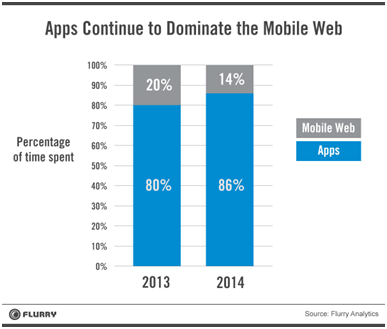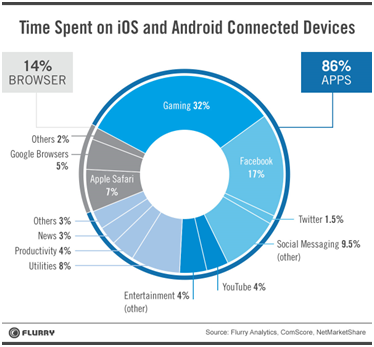Mobile Browsers vs. Apps
Mobile devices are a part of every marketer’s digital strategy. Marketers are going all out in creating mobile websites, working on their SEO and building engaging apps.
How do mobile websites and apps differ?
A mobile website is a site that is meant to be accessed on mobile devices and which adapts to varying screen sizes. It is a basic version of a desktop site with better usability, re-organization of content to fit smaller screens etc.
A mobile app is software that operates on specific mobile device operating systems and is designed to perform specific functions. Many apps are exclusive to iPhones/iPads/Android-based devices.

Statistics from the Q1, 2014 study by Flurry reveal that mobile apps win in the contest with mobile browsers.
Of the 2 hours and 42 minutes people spend on their mobile devices, 2 hours and 20 minutes (86% of their time) is spent on mobile apps! Only the rest of the 22 minutes are spent browsing mobile websites.
People prefer to access information through apps rather than go to mobile websites on browsers. A major factor responsible for the popularity of apps is games. But people are also using social media apps to keep in touch with their digital lives. Among various mobile operating systems, predictably, Android and iOS are at the top:
But before you pick apps just because they are more popular, check out the following sections that examine important features of both mobile apps and websites:
Some Advantages of Mobile Apps
- Apps provide brand access to more targeted audience groups
- ROI is higher due to improved targeting
- Remarkable user engagement and experiences
- Striking visuals due to effects and animations
- Can be developed for different operating systems and devices using native codes
- Easy for users to download and install on their mobile devices
- Apps can be used even without an internet connection
- Can be easily found on app stores through a search
- Brands can easily charge for their apps on app marketplaces, if they want to
The Advantages of Mobile Websites

- Mobile websites can be accessed easily with a mobile browser
- It is easy to develop with standard development tools. The current best practice is to use HTML5 and CSS3.
- They are generally less expensive compared to app development
- Available to users immediately after publishing. It does not require any submission approval process from app marketplaces.
- It does not need any installation since it is web-based.
- Can be easily found with a standard search
Choosing Between Mobile Apps and Websites: Aspects to Consider
- What is your main purpose – do you want to provide information to your mobile audience or do you want to promote downloads for a specific product that will need frequent updates?
Depending on your purpose, you need to decide between a mobile website and an app. A mobile website can help you answer all generic user queries. An app can help in achieving very specific goals like promoting a specific product.
- Do you want to build engagement with your audience?
Apps are a great way of building engagement with your audience. If you can identify a hook by which you can get your audience to download and use your app frequently, it will do wonders for your brand. If you just have information updates, then most would prefer to check your mobile site.
- How interactive and graphics-driven is your content?
Loading a mobile site with a lot of graphics will slow its load time but apps support graphics well.
- What is your budget?
Apps are more expensive and complex to develop since they require resubmissions on app stores when updated and require developers to have a much varied skill set. On the contrary, mobile websites are usually not as expensive.
What is your pick? Which suits your business better – mobile apps or mobile websites?

